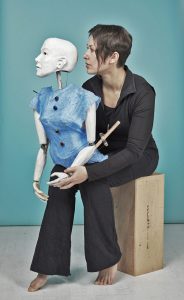
- This event has passed.
Ruby Friday | Puppetry and the Poetic Body in Medicine, Health, and Healing
April 5, 2019 @ 12:00 pm - 1:00 pm

Marina Tsaplina is a puppeteer and performing artist based in Brooklyn, NY whose work looks at the unique capacities of puppetry-bodies/objects to reveal embodiment, imagination, and the historic and poetic body in illness, (dis)ability and healing. She is the Health Humanities Lab artist-in-residence this semester and is artist lead of Reimagining Medicine, a medical humanities project based at Duke. She was in residence at Duke last summer, working alongside Theater Studies faculty Torry Bend and Jules Odendahl-James to conduct a series of intensive workshops with Duke undergraduates on a pre-health track.
Tsaplina will talk about the unique role of puppetry in her deep engagement with the health humanities. Puppetry’s practices cultivate presence, attention, and imagination—three dimensions that engage future healthcare providers in a practice that holds healing at its core. In the program Tsaplina did with Duke undergraduates, puppetry was the central vehicle for exploring not only creative imagination and storytelling but embodiment itself. Furthermore, puppetry is an effective way to include bodies and stories too often left out of diagnostic narratives—because puppets are a material site of pure imagination, straddling the line between “it” and “you,” they are able to convey the testimony of another without taking it hostage.
Tsaplina, Odendahl-James, and Bend describe their work with Duke students in the article “Attending to the ‘Illusion of Life’: Reimagining Medicine through the Art of Puppetry Practice,” in Puppetry International (PDF). Learn more about Reimagine Medicine from the program’s web page or in this Duke Today feature story. You can read about Tsaplina’s Health Humanities Lab project Illness Revelations: The Bodies of History/Medicine, here.
This event is hosted by The Rubenstein Arts Center.
